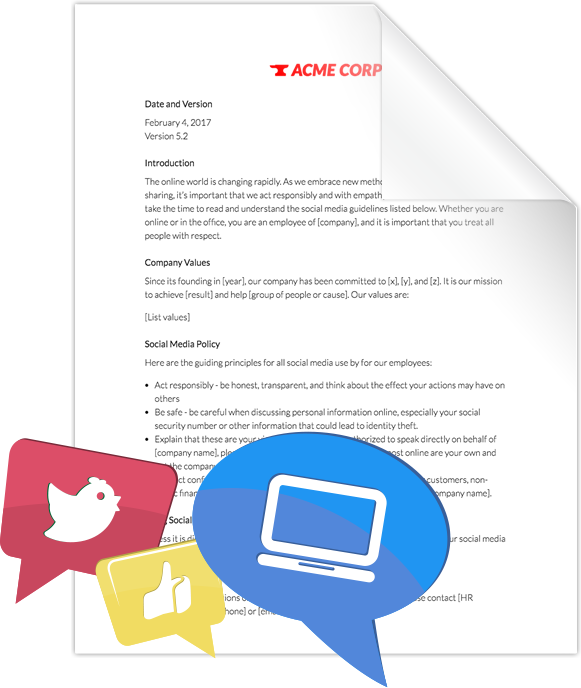Sample Social Media Policies
What are some sample social media policies used by other organizations? How can you help your team follow your social media guidelines? Are there social media policy examples publicly available that anyone can look at?
We’re happy to say that the answers to these questions are yes, see below, and yes. Feel free to use the sample below to create social media guidelines for your organization. Of course, as always, be sure to have legal and/or HR representative review your policy before your share it with the company.
Sample Social Media Policy Template

Date and Version
February 4, 2017
Version 5.2
Introduction
The online world is changing rapidly. As we embrace new methods of communication and sharing, it’s important that we act responsibly and with empathy for those around us. Please take the time to read and understand the social media guidelines listed below. Whether you are online or in the office, you are an employee of [company], and it is important that you treat all people with respect.
Company Values
Since its founding in [year], our company has been committed to [x], [y], and [z]. It is our mission to achieve [result] and help [group of people or cause]. Our values are:
[List values]
Social Media Policy
Here are the guiding principles for all social media use by for our employees:
- Act responsibly – be honest, transparent, and think about the effect your actions may have on others
- Be safe – be careful when discussing personal information online, especially your social security number or other information that could lead to identity theft.
- Explain that these are your views – Unless you are authorized to speak directly on behalf of [company name], please make it very clear that any views you post online are your own and not the company’s.
- Respect confidentiality – Never disclose personal information about our customers, non-public financial data, or any other legal or proprietary information about [company name].
Using Social Media at Work
Unless it is directly related to the work you do at [company name], please limit your social media use while in the office or working on behalf of our organization.
More Information
If you have any questions or concerns about our social media policy, please contact [HR Representative] at [phone] or [email].
Social Media Policy Examples
What do social media policies look like at Fortune 500 businesses? Are there public examples of corporate or nonprofit social media policies? So good of you to ask! We’ve included social media policy examples from a number of leading businesses and organizations below.
Social Media Policy Best Practices
How do you write a social media policy that works for your business? We’ve put together a handful of tips and best practices that can help you create a successful social media policy followed by employees at all levels of the organization.
-
Write clearly
It’s one thing to create an effective social media policy. It’s another
thing altogether to communicate it to your team. Take the time to write a
clear, succinct, and specific policy document that can be understood by
every employee in your organization. -
Work with a
designer
Did you review the social media policies from Cisco, Coke, and others we
shared? Some of them look better than others. Some of them are easier to
read than others. Some of them look like legal documents, rather than a
positive employee communication. If you want your employees to read your
social media policy, it’s important to design the document so that it is
friendly, modern, and easy to read. -
Tie policy
goals to business objectives
Of course your social media policy is intended to keep your employees, your
organization, and your brand safe. But this policy is also an opportunity to
remind your team of what specifically this policy is entrusted with
guarding. It’s a chance to revisit your brand messaging and company mission,
and clearly tie these high-level company goals to work that your employees
do every day. Are you a nonprofit? Inappropriate social media posts by your
employees can hurt fundraising efforts, which in turn, make it more
difficult to achieve your mission of education, environmental awareness,
etc. Making those direct links can help employees internalize social media
policies and adhere to the rules set forth by your company. -
Define key
terms
Without proper definitions, some of your employees might read your social
media policy as “never do jargon jargon thing,” or “jargon acronym jargon
blah.” This is clearly not ideal. Take the time to write definitions for any
industry term, social media slang (e.g., “Twitter handle”), or acronym that
you want your employees to understand. -
Provide
examples
This could be said for any company-wide communication, but it’s particularly
true here. Your employees may run the gamut from social media pros to
introverted technophobes, and it can be challenging to write a clear message
that resonates with the entire team. Offering examples of what and what not
to do can help ensure an effective social media policy. -
Highlight
industry-specific regulations
If you work in healthcare, education, energy, or other highly regulated
industries, it’s likely you and your employees are subject to more
restrictive rules around sharing client, partner, and company information
online. Be sure to explicitly state any social media policy restrictions
that are relevant to your business. -
Be
transparent
Are you monitoring your employees’ social media activities in the office? Do
you active review posts and track who is or is not promoting the business?
In clear terms, let your employees know to what degree, if at all, you are
reviewing their online activities. -
Provide an HR
contact.
Even the best-written social media policies can be confusing for some
employees, particularly those who are not familiar with Facebook, Twitter,
etc. It’s important to provide an easy way for employees to get answer to
their questions — before they start posting possibly harmful content online. -
Work with a
lawyer
Take the time to have a lawyer review your social media policy to ensure
that it is legal and appropriate. -
Schedule an
annual policy review
How many new social media platforms come out each year? A dozen? A hundred?
What about virtual reality and other emergent technologies? Given the rapid
growth of the online world, it’s wise to sit down and review your policy
every year, just to make sure all your bases are covered.
* This content does not constitute legal advice. Please work with a legal or HR expert, as employment laws may vary country to country and state to state.










